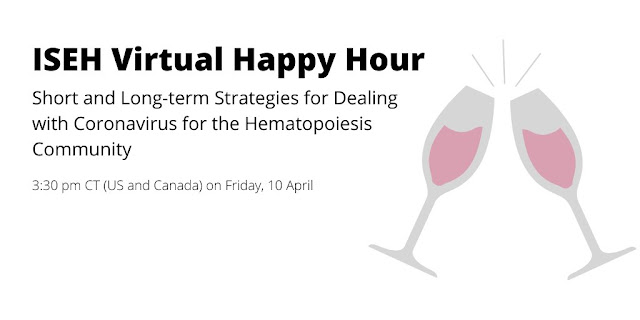COVID 19 Series: Happy Hour Wrap-Up
On April 10th, ISEH hosed a webinar – actually more of a ‘Happy Hour’ to discuss the impact of COVID-19 on academic laboratories across the world. Led by an impromptu panel of investigators (Camilla Forsberg, Trista North, Ross Levine, Len Zon, Kristina Kirshner, Momoko Yoshimoto-Kobayashi, Hanna Mikkola, Jennifer Trowbridge and Grant Rowe), we discussed the impact the global pandemic on our laboratory operations, our careers and those of trainees, and transitioning to work from home. Katie Strang and Dovile Svirupskaite mediated the event and answered questions on the side in the parallel chat conversation.
We are looking forward to holding another virtual meeting in the coming weeks to touch on these issues and new challenges faced by investigators all over the world.
Here, we will present some highlights:
On laboratory operations
Most panelists faced a total shutdown of laboratory research, with access to facilities limited to ‘essential personnel’ necessary to maintain equipment. Some institutions prohibit students and postdocs from being designated as ‘essential’, with considerable variation in staffing guidelines. The process of shutting down labs was also quite variable, ranging from 10 days’ notice to 24 hours’ notice for cessation of research operations. There was also variability as to expectations during the shutdown - at some institutions, core facilities remain in operation. Overall, there seemed to be no clear consistency among institutions as to what activities and personnel are considered "essential".
Most researchers scaled back their animal colonies to maintain only essential strains, even cryopreserving key strains. Some researchers have not been asked to decrease numbers but have chosen to do so anticipating strains on resources and personnel. Others have marked "non-essential" cages in the event that staff are not available for their maintenance. There was a discussion of encouraging funding agencies to support re-derivation of animals and shipping animals to colleagues to facilitate restarting research.
At this point, for most US and International labs, the duration of the shutdown is not yet defined. There do not seem to be clear plans as to how to open labs, but the consensus is that there should be a gradual ramp-up in activities. Some universities have asked PI's to calculate what they have lost in funds and productivity, but the consensus was that this could not readily be done, and it was unclear as to what would done with such estimates.
A general concern is that it remains to be seen how a prolonged cessation of active research will impact grant applications and manuscript reviews and revisions since further data cannot be generated for the foreseeable future. We were hopeful of journals, funding organizations, and reviewers considering this situation in their decision making and recommendations.
Maintaining cohesion
PI’s generally are making efforts to maintain strong cohesion among their group members. Most PI's are holding lab meetings, individual meetings, and ‘happy hours’ by Zoom. PIs are also encouraging trainees work on manuscripts and data analysis to think about how research can be improved, as well as to take this time to create well thought out experimental plans and future directions for when labs are operational again. Many PIs are encouraging their labs to watch online seminars, webinars, and journal clubs to keep their groups scientifically engaged.
Education
Most felt that it seems that summer rotations for graduate students and undergrads would likely not be held in person. Trista North brought up the problem of rotation students and undergraduates being at risk of being cut off from social contact since their families and friends often live far from where they attend school, and they are less well integrated into their respective lab cultures. She advocated for PIs to include students in lab activities whether or not they are permanent members of your lab group. Kristina Kirshner also emphasized that students often live by themselves and that they as mentors at her institution have been instructed to contact students at least twice a week for mental health reasons.
A major question was raised as to how to continue to pay trainees on the job market, anticipating widespread hiring freezes at academic institutions. The consensus was that PI’s should make every effort to support their trainees that might be affected.
Travel
Most institutions have restricted work-related travel. Many researchers mentioned they may not feel comfortable going to meetings for a while even with social distancing maintained. Many meetings have been converted to the virtual format, though the plan for the ISEH annual meeting remains the same.
Miscellaneous
Francesca Ficara in Italy made the point that until schools for young children are open again, this will make it impractical for parents to start lab research again. This is anticipated to be a widespread problem for investigators with children who attend summer camps, daycare, and school.
Compiled by: Patricia Ernst, Heather O'Leary, Grant Rowe, and Grant Challen


.png)


Comments
Post a Comment